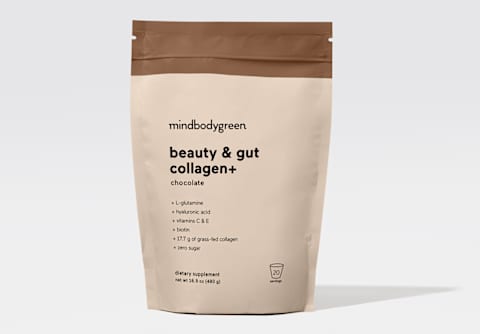Advertisement
Do Collagen Supplements Play A Role In Oral Care? Here's What We Know


Relative to other buzzy categories in the beauty zeitgeist, oral care does not receive a ton of attention. (When it comes to the mouth area, the lips steal most of the spotlight, wouldn't you say?) The "oral beauty" bracket is up and coming, don't get me wrong, but most dental routines stick within the confines of brush, floss, and repeat.
Other than a few rounds of whitening strips and regular trips to the dentist, how else can you secure a dazzling smile?
Our answer: Don't sleep on collagen supplements. We recently got the scoop on how collagen can enhance your oral health—ahead, a holistic dentist weighs in.*
Does collagen play a role in oral care?
We know collagen has benefits for bone health, but, contrary to popular belief, teeth are not actually made up of bones (please tell me I'm not the only one floored by this).*
Rather, the outermost layer of your teeth is called the enamel, which is made of calcium and phosphate, not bone (although bone is made up of hydroxyapatite crystals, involving calcium and phosphate, nestled in a collagen matrix—like we said, it's technical). Alas, the enamel does not have any collagen composition.
However! "As we dive deeper inside the tooth and to the surrounding structures, collagen begins to play a key role," notes board-certified holistic dentist Staci Whitman, DMD. "Type I, type II, and type III collagens are all found within the pulpal nerve tissues of teeth, likely being secreted by odontoblasts and fibroblasts from within the dentinal tubules and pulpal layers of our teeth."
The pulp is essentially connective tissue that makes up the center of the tooth1, and that's where your collagen resides.
Plus, collagen is crucial for the health of your periodontium, or the structure of gums and bone that support and surround your teeth (so bones do make an appearance!).*
Without collagen, in fact, this structure would not even exist. "Our periodontal tissues are composed of primarily collagen, with 60% collagen making up our gingival tissues, 70 to 80% making up our periodontal ligaments (or structures that connect our teeth into the surrounding jawbones), and 90% of the alveolar bone in the jaws," says Whitman.
All that being said: Collagen has a pretty significant role to play.
What can collagen supplements do for your teeth?
Here, the science gets a little murky. "Unfortunately, to date, we cannot take collagen supplements and expect that they will help us to regrow receding gums or restore lost bone around our teeth," says Whitman. "But providing your body and mouths with adequate amounts of collagen may very likely help us keep our smiles and jaws healthy for longer.*"
Given the fact that collagen supplements have been shown to enhance bone density2, we can assume they can keep the bones in the periodontium supported as well.* Specific research on the periodontium remains untapped, likely because bone density is a bit more time-consuming to track (the bone turnover timeline is quite long).
But collagen peptides have been shown to promote gum health: "There has been research demonstrating that a novel method using bovine collagen is able to enhance gum integrity3, resulting in thicker gums around the teeth and, in over half the cases, complete coverage of exposed roots,"* recounts Whitman.
Of course, we need way more research on how this works, exactly, but the potential is certainly there. "Being able to regrow and regenerate gum and bone tissues around teeth would be revolutionary," says Whitman.*
Whitman also identifies hyaluronic acid as another promising area of research. Your body makes the buzzy humectant naturally, and it's found in a wide range of areas—eyes, joints, skin, and, yep, your gums. "Within dentistry, hyaluronic acid has shown anti-inflammatory and antibacterial effects," says Whitman, and it even has the ability to help keep your gums healthy4.*
Again, we need more studies on the HA-dental connection, but let's not forget that hyaluronic acid can increase collagen production—which as we noted above, is important for your most optimal smile.*
That's why you can find hyaluronic acid in a variety of collagen supplements to support your natural collagen, elastin, and hyaluronic acid levels in one fell swoop.*
The takeaway
We're continuing to learn more and more about how collagen supplements affect whole-body health, and dentistry is no different. Collagen plays a key role in tooth and gum health, but the direct impact of oral supplementation is still not quite understood—the research is promising, though, and there are a host of reasons to start a regular collagen routine, anyway.*
